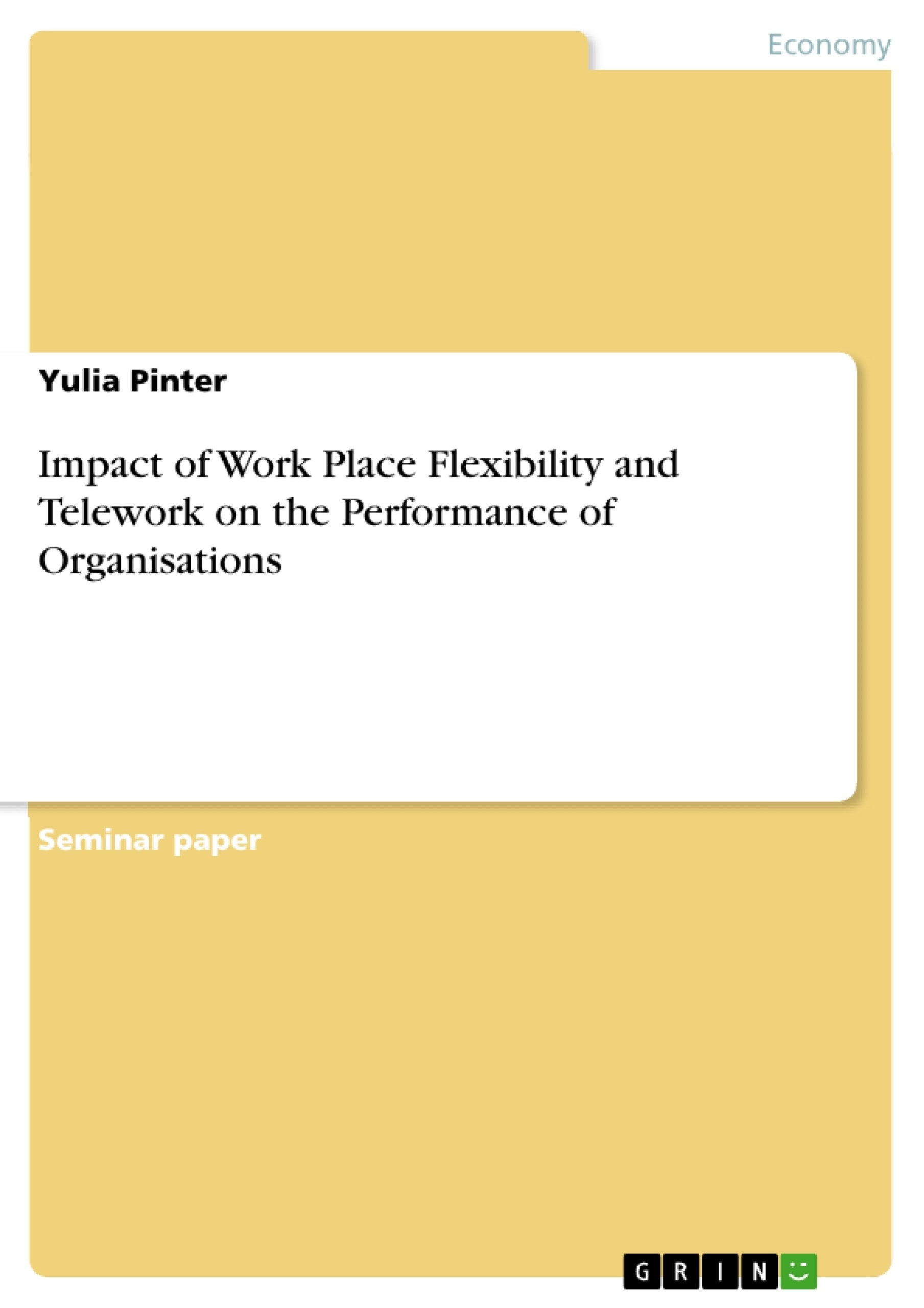I would like to start this paper with a quote from the American president: “[Workplace flexibility] is an issue that affects the well-being of our families and the success of our businesses. It affects the strength of our economy -- whether we’ll create the workplaces and jobs of the future we need to compete in today’s global economy” (Obama, 2010, p.1).
The World at Work report states that “employers in advanced economies could face a shortage of 16 to 18 million college-educated workers in 2020 … many nations can narrow the skill gap raising the labor force participation rate of college-educated women and keeping older high-skill workers [emphasis not in original] in the labor force” (Dobbs et al, 2012).
One of the possible ways to handle this problem is to implement work place flexibility and telework opportunities for these two groups of employees.
Commerzbank is the second largest bank in Germany and Poland with more than 54,000 employees around the globe (Commerzbank, 2014, p.1). Its business is influenced by world labour trends, as well as the business of other organisations. The purpose of this paper is to demonstrate a theoretical basis of flexible work arrangements and telework for Commerzbank. The implementation of work place flexibility should definitely help Commerzbank retain its competitiveness and attractiveness on the international labour market.
Inhaltsverzeichnis (Table of Contents)
- Introduction
- Main definitions of work place flexibility and telework
- Overview of telework in Germany and the EU
- Impact of work place flexibility and telework on organisations' key performing indicators
- Impact on staff turnover and retention
- Impact on absenteeism and health
- Impact on productivity and organisational costs
- Disadvantages of work flexibility and telework for employees and organisations
- Conclusion and recommendations
- List of references
Zielsetzung und Themenschwerpunkte (Objectives and Key Themes)
This paper explores the economic impact of work place flexibility and telework on the performance of organizations, particularly focusing on the example of Commerzbank, a leading German bank. The paper aims to demonstrate the theoretical basis of flexible work arrangements and telework and their potential benefits for organizations.
- The impact of work place flexibility and telework on staff turnover and retention.
- The influence of flexible work arrangements on staff absenteeism and health.
- The relationship between work flexibility and telework on productivity and organizational costs.
- The potential disadvantages of flexible work arrangements and telework for employees and organizations.
- The implications of work place flexibility and telework for organizational competitiveness and attractiveness in the global labor market.
Zusammenfassung der Kapitel (Chapter Summaries)
The paper begins by defining work place flexibility and telework, outlining the different aspects of flexibility and providing a clear definition of telework for quantitative analysis. The paper then explores the prevalence of telework in Germany and the EU, highlighting the trends and factors influencing its adoption. The paper further examines the impact of work place flexibility and telework on key organizational performance indicators, including staff turnover, absenteeism, productivity, and costs. It explores the positive relationships between these factors and the implementation of flexible work arrangements. Finally, the paper discusses potential disadvantages of work flexibility and telework, considering both employee and organizational perspectives.
Schlüsselwörter (Keywords)
The paper focuses on the economic impact of work place flexibility and telework on organizational performance, using Commerzbank as a case study. The key themes explored include staff turnover and retention, absenteeism and health, productivity and organizational costs, and the overall impact on organizational competitiveness and attractiveness. The paper utilizes a theoretical framework to analyze the relationship between these factors and the implementation of flexible work arrangements, considering both the advantages and disadvantages of telework.
Frequently Asked Questions
How does workplace flexibility impact staff retention?
Flexible work arrangements and telework are shown to increase labor force participation and help retain high-skill workers, particularly college-educated women and older employees.
What are the benefits of telework for organizational productivity?
Telework can lead to increased productivity and reduced organizational costs by optimizing workspace and allowing employees to work in environments that may improve focus.
Does flexible work affect employee health and absenteeism?
Yes, studies indicate a positive relationship between flexible arrangements and reduced staff absenteeism, as it can lead to better work-life balance and improved overall well-being.
What are the potential disadvantages of telework for organizations?
Potential drawbacks include challenges in communication, difficulty in maintaining company culture, and possible issues with monitoring performance or ensuring data security.
Why is Commerzbank used as a case study in this paper?
As a major international bank, Commerzbank faces global labor trends; implementing flexibility is crucial for its competitiveness and attractiveness in the global talent market.
What is the expected labor shortage mentioned for 2020?
The report suggests advanced economies could face a shortage of 16 to 18 million college-educated workers, making flexible work a key strategy to narrow this skill gap.
- Quote paper
- Yulia Pinter (Author), 2014, Impact of Work Place Flexibility and Telework on the Performance of Organisations, Munich, GRIN Verlag, https://www.grin.com/document/299890



